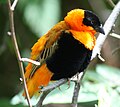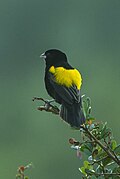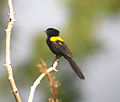Euplectes
| Euplectes | |
|---|---|

| |
| Euplectes afer ladoensis (above) E. macrourus macrocercus (below) | |
| Scientific classification | |
| Domain: | Eukaryota |
| Kingdom: | Animalia |
| Phylum: | Chordata |
| Class: | Aves |
| Order: | Passeriformes |
| Family: | Ploceidae |
| Genus: | Euplectes Swainson, 1829 |
| Type species | |
| Loxia orix Linnaeus, 1758 | |
| Species | |
|
See text | |
Euplectes is a genus of passerine bird in the weaver family, Ploceidae, that contains the bishops and widowbirds. They are all native to Africa south of the Sahara. It is believed that all birds in the genus are probably polygynous.[1]
The genus Euplectes was introduced by the English naturalist William John Swainson in 1829 with the southern red bishop as the type species.[2][3] The name combines the Ancient Greek eu meaning "fine" or "good" with the Neo-Latin plectes meaning "weaver".[4] When choosing their mates, females within this genus will often choose males with longer tail lengths, even in species with comparatively shorter tail lengths.[5]
Species
The genus contains 18 species.[6]
| Image | Scientific name | Common Name | Distribution |
|---|---|---|---|
 |
Euplectes afer | Yellow-crowned bishop | sparsely distributed across Sub-Saharan Africa |
| Euplectes diadematus | Fire-fronted bishop | Kenya, Somalia, and Tanzania | |
 |
Euplectes aureus | Golden-backed bishop | western Angola and São Tomé Island |
 |
Euplectes gierowii | Black bishop | Angola, Cameroon, Central African Republic, Republic of the Congo, Democratic Republic of the Congo, Ethiopia, Kenya, South Sudan, Tanzania, and Uganda |
 |
Euplectes nigroventris | Zanzibar red bishop | Kenya, Mozambique, and Tanzania |
 |
Euplectes hordeaceus | Black-winged red bishop | Senegal to Sudan and south to Angola, Tanzania, Zimbabwe and Mozambique |
 |
Euplectes orix | Southern red bishop or red bishop, | north to Angola, southern and eastern parts of the Democratic Republic of Congo,northern Zambia southern Uganda north-east Nigeria and south-west Kenya |
 |
Euplectes franciscanus | Northern red bishop or orange bishop, | Africa south of the Sahara Desert and north of the Equator |
 |
Euplectes capensis | Yellow bishop | Afromontane |
 |
Euplectes axillaris | Fan-tailed widowbird | Angola, Botswana, Burundi, Cameroon, Central African Republic, Chad, Republic of the Congo, DRC, Eswatini, Ethiopia, Kenya, Lesotho, Malawi, Mali, Mozambique, Namibia, Niger, Nigeria, Rwanda, Somalia, South Africa, Sudan, Tanzania, Uganda, Zambia, and Zimbabwe |
 |
Euplectes macroura | Yellow-mantled widowbird | Angola, Benin, Burkina Faso, Burundi, Cameroon, Central African Republic, Chad, Republic of the Congo, Democratic Republic of the Congo, Ivory Coast, Gabon, Gambia, Ghana, Guinea, Guinea-Bissau, Liberia, Malawi, Mali, Mozambique, Niger, Nigeria, Senegal, Sierra Leone, Sudan, Tanzania, Togo, Zambia and Zimbabwe. |
 |
Euplectes hartlaubi | Marsh widowbird | Angola, Cameroon, Republic of the Congo, Democratic Republic of the Congo, Gabon, Kenya, Nigeria, Tanzania, Uganda, and Zambia. |
 |
Euplectes psammacromius | Montane widowbird | northeast Zambia, northern Malawi and the highlands of southwestern Tanzania |
 |
Euplectes albonotatus | White-winged widowbird | Angola, Botswana, Burundi, Central African Republic, the Republic of the Congo, the Democratic Republic of the Congo, Eswatini, Ethiopia, Gabon, Kenya, Malawi, Mozambique, Namibia, Rwanda, São Tomé, South Africa, Sudan, Tanzania, Uganda, Zambia, and Zimbabwe |
 |
Euplectes ardens | Red-collared widowbird | Guinea, inland Sierra Leone, north Liberia, north Ivory Coast, southwest Niger, central and southeast Nigeria, Cameroon, Central African Republic, Democratic Republic of Congo, central and northeast Angola, Uganda, West Kenya, Tanzania, Malawi, northwest and south Mozambique, Eswatini and east South Africa |
 |
Euplectes laticauda | Red-cowled widowbird | Sudan, Eritrea, Ethiopia, Kenya and north Tanzania |
 |
Euplectes progne | Long-tailed widowbird | Angola, Botswana, the Democratic Republic of the Congo, Eswatini, Kenya, Lesotho, South Africa, and Zambia |
 |
Euplectes jacksoni | Jackson's widowbird | Kenya and Tanzania |
Aviculture
The yellow-crowned bishop and northern red bishop are popular in aviculture.
References
- ^ Craig, Adrian J. F. K. (1980). "Behaviour and evolution in the genus Euplectes". Journal of Ornithology. 121 (2): 144–161. Bibcode:1980JOrni.121..144C. doi:10.1007/BF01642928. S2CID 34686786.
- ^ Swainson, William John (1829). Zoological illustrations, or, Original figures and descriptions of new, rare, or interesting animals. 2nd series. Vol. 1. London: Baldwin, Cradock, and Joy; and W. Wood. Plate 37 text.
- ^ Mayr, Ernst; Greenway, James C. Jr, eds. (1962). Check-List of Birds of the World. Vol. 15. Cambridge, Massachusetts: Museum of Comparative Zoology. p. 64.
- ^ Jobling, James A. (2010). The Helm Dictionary of Scientific Bird Names. London: Christopher Helm. p. 153. ISBN 978-1-4081-2501-4.
- ^ Pryke, Sarah; Andersson, Staffan (August 8, 2008). "Female preferences for long tails constrained by species recognition in short-tailed red bishops". Behavioral Ecology. 19 (6): 1116–1121. doi:10.1093/beheco/arn100.
- ^ Gill, Frank; Donsker, David; Rasmussen, Pamela, eds. (January 2023). "Old World sparrows, snowfinches, weavers". IOC World Bird List Version 13.1. International Ornithologists' Union. Retrieved 7 February 2023.
External links
